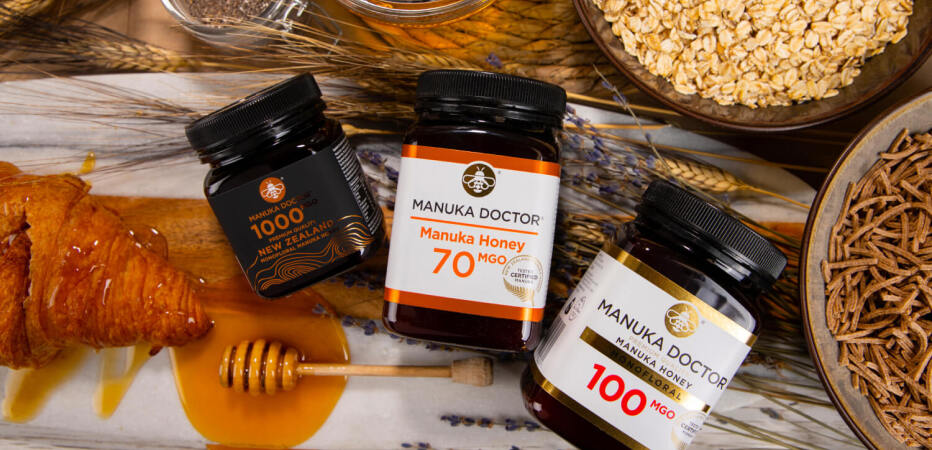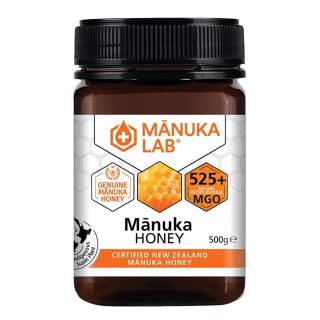What is manuka honey?
What is
manuka honey? It's like "honey with a surname" as manuka is a Māori word from the Māori tribe of New Zealand that means "
with energy”, “with good mood”. The bees collect the nectar during the few weeks of flowering of the
Leptospermum scoparium plant which belongs to the myrtle family. This plant is native to New Zealand and south-eastern Australia. It is worth noting here that manuka honey is
monofloral which makes it special. Also, all products carry a
special authenticity certification mark. It has a particularly thick texture, a rich 'full' earthy flavor and a distinctive color with notes of cream and deep amber. Greek
manuka honey does not exist because, as mentioned above, the
Leptospermum scoparium plant does not grow in our country. Think of it like: Producing Kythera (Greek island) honey in New Zealand, is it possible? I don’t think so. It has
a protected designation of origin.
What are the main functions of manuka honey?
- Antioxidant
- Antimicrobial
- Anti-inflammatory
- Immunomodulatory ~ Anticancer
- Wound Healing
Manuka honey is a good source of phenolics and unique chemical compounds, such as:
- Methylglyoxal (MGO, an antibacterial marker),
- dihydroxyacetone (DHA, honey aging indicator),
- Leptosperin glyoxal (indicator of pollen origin),
- methylsirrigine and
- leptosin and
- 5-hydroxymethylfurfural (HMF, honey freshness indicator).
Methylglyoxal is represented by the initials MGO which is an important antibacterial marker and is shown on the packaging along with a number. The numbers indicate the amount of MGO (in mg/kg) and the total antimicrobial activity. The higher the MGO number, the higher the content of methylglyoxal in the product, which means that its antibacterial activity increases. Correspondingly, the price of manuka honey increases with the MGO level. The increased price is related to both its high quality and its uniqueness.
At particularly high temperatures (baking, boiling water) the MGO index decreases and so do its beneficial properties. It is therefore recommended to consume it raw in order to protect our immune system. A small amount (1 teaspoon, 5g) in the morning in combination with our breakfast is the best option!
Note: Honey is not recommended for infants under one year of age.
The composition of manuka honey
Like all honeys,
manuka honey is composed of carbohydrates, mainly the monosaccharides glucose and fructose, and a very small proportion of disaccharides. Traces of protein come mainly from the bees and the nectar, but are a negligible quantity. According to the literature, there are reports on the determination of the potassium content of
manuka honey and the
minerals calcium, magnesium and sodium. In addition,
vitamin C and
B vitamins (thiamine, riboflavin, pantothenic acid & pyridoxine) contribute to the nutritional value of honey. However, the greatest nutritional value is due to its antioxidants, such as
polyphenols and
flavonoids. The moisture content ranges from 17 - 20% which also determines the viscosity ~
liquidity of honey. The flavonoids detected in honey are mainly quercetin and luteolin which are powerful antioxidants.
It is well known that a diet rich in antioxidants shields us since they help remove free radicals from the body's cells and therefore protect against the damage caused by oxidation. Increased oxidation (so-called oxidative stress) is caused by various factors such as stress, smoking, sunlight, alcohol consumption, environmental pollution, etc.
Innovative applications of manuka honey
Manuka honey has attracted scientific interest and more and more research is coming to light. Let's go together to see what science has told us so far!
According to the research by Shweta Sinha and colleagues,
manuka honey acts synergistically with medication such as antibiotics, as it seems to enhance their effectiveness and can reduce the time of administration. Due to its composition, its antimicrobial activity fights bacteria, fungi, certain viruses and parasites. We could therefore say that it is a "natural shield" for our immune system.
Extra info: Did you know that there is resistance to antibiotics, the body resists their action after a certain point, and making them ineffective? For this reason, it becomes imperative to design new ones, however this is not always possible. Thus, scientists are tuning to the use of natural ingredients, such as honey, to investigate its effectiveness. Recent research has shown that honey offers new potential for the development of natural, chemical-free antibacterial and antifungal products.
In other research we learn that
manuka honey was used by researchers in the field of tissue engineering to design a regeneration model. In the conclusions, it was found that in addition to inhibiting bacterial growth,
glyoxal (GO) and methylglyoxal (MGO) can enhance wound healing and tissue regeneration through their immunomodulatory property.
Much interest has also developed in the field of the use of manuka honey in cosmetology, i.e. its use in external products such as moisturizing and healing creams. It is a natural anti-inflammatory for the skin, providing soothing relief for acne, eczema, dermatitis, wounds, diabetic ulcers and other skin irritations.
Side effects after consuming or using products containing
manuka honey may occur in some of those who are allergic to the pollen. There may be a "pulling sensation" on the skin. Try a small amount on your skin before applying the product.
Consult your doctor if you have an allergy or medical condition.
Finally, many studies have been carried out on the
authenticity of
manuka honey. The reason was due to its increased popularity and its great exploitation at the altar of profit. Thus, it was necessary to establish the authenticity index of manuka honey called Unique Manuka Factor (UMF). The authenticity test involves the measurement of its particular components methyl glucoxal (MGO), dihydroxyacetone (DHA) leptosperin, and 5-hydroxymethylfurfural (HMF).
Summary
So we conclude that
manuka honey is of unique high quality. Its composition rightly classifies it as "the nutritional treasure" with multiple benefits for our health. A diet rich in antioxidants can reduce the risk of many diseases (including heart disease and certain cancers). A small amount of
manuka honey is enough to shield our body against diseases, seasonal infections and skin conditions as it provides us with antioxidant, antimicrobial, anti-inflammatory, immunomodulatory ~ anti-cancer and healing properties. You can find
manuka honey in Holland & Barrett's natural
stores in Athens and Thessaloniki as well as on the website. Don't forget that the higher the MGO index, the more enhanced its properties.
Because nature knows best of all!
Scientific references
Alangari AA, Ashoori MD, Alwan W, Dawe HR, Stockinger B, Barker JN, Wincent E, Di Meglio P. Manuka honey activates the aryl hydrocarbon receptor: Implications for skin inflammation. Pharmacol Res. 2023 Aug;194:106848.
Dahiya D, Mackin C, Nigam PS. Studies on bioactivities of Manuka and regional varieties of honey for their potential use as natural antibiotic agents for infection control related to wound healing and in pharmaceutical formulations. AIMS Microbiol. 2024 May 6;10(2):288-310.
Harrison J. Manuka Honey: A Case Study of Severe Atopic Eczematous Dermatitis Reaction to Henna Tattoo. Plast Surg Nurs. 2017 Oct/Dec;37(4):154-157.
Hegazi NM, Elghani GEA, Farag MA. The super-food Manuka honey, a comprehensive review of its analysis and authenticity approaches. J Food Sci Technol. 2022 Jul;59(7):2527-2534.
Niaz K, Maqbool F, Bahadar H, Abdollahi M. Health Benefits of Manuka Honey as an Essential Constituent for Tissue Regeneration. Curr Drug Metab. 2017;18(10):881-892.
Sinha S, Sehgal A, Ray S, Sehgal R. Benefits of Manuka Honey in the Management of Infectious Diseases: Recent Advances and Prospects. Mini Rev Med Chem. 2023;23(20):1928-1941.
Sunan Wang, Yi Qiu, Fan Zhu. An updated review of functional ingredients of Manuka honey and their value-added innovations. Food Chemistry,Volume 440,2024,138060,ISSN 0308-8146.
Woodward S. Moisture-associated skin damage: use of a skin protectant containing manuka honey. Br J Nurs. 2019 Mar 28;28(6):329-335.




















